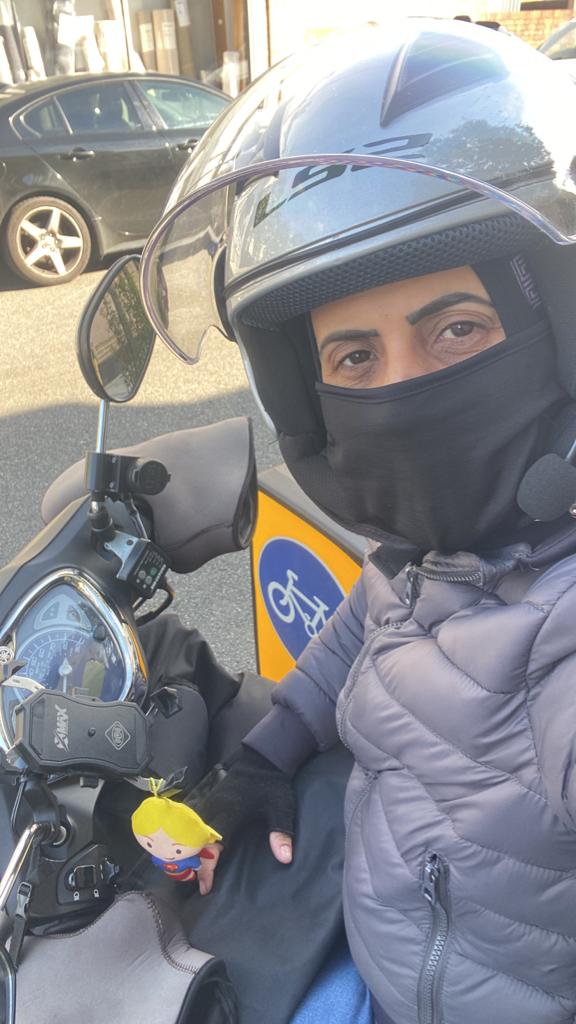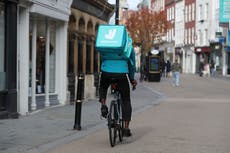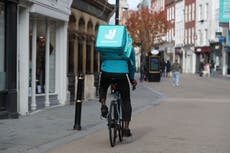Female delivery drivers plagued with sexual harassment: ‘He opened the door, he was completely naked’
‘Very often the guy is in his underwear or is shirtless and acts in a sexually provocative way,’ a Deliveroo driver tells Maya Oppenheim


Frozen from fear as a customer stood naked in the doorway in front of her, the female food delivery driver felt afraid, powerless and alone.
The woman, who was too scared to be named, recalled how when she arrived at the customer’s house everything seemed normal: “He saw me through the window, waved and I walked towards the door.”
But things soon took a turn. “When he opened the door, he was completely naked,” she said.
The woman was left shaken by the encounter and said she felt especially vulnerable as a migrant living in the UK, so did not want to complain. “I was very afraid because I felt powerless,” she added. “At the time I didn’t have a visa so I felt my hands were tied.”
Her experience is not an isolated one. A number of migrant women who work as delivery drivers in London told The Independent they regularly experience sexual harassment from customers and restaurant workers. And experts warn the nature of the gig economy, which includes freelance jobs such as delivery roles, often means lone working where women especially find themselves in vulnerable situations.
Fernanda Souza, who works for Deliveroo, Just Eat and UberEats in the capital, recalled an occasion when a man she was dropping off food to opened the door in his underwear.
“I left the food on the doormat and he said I needed to come in and help feed him the food,” the 32-year-old, who rides an electric bike while working, added. “It was obvious he didn’t need help. There were sexual connotations. I got really scared and I ran off and got on my bike.”
But the advances and inappropriate behaviour don’t stop with customers, she said. Ms Souza, who has lived in London for six years, says restaurant managers she encounters are “ruder” and more “aggressive” to the female delivery drivers.
“When you ask when the food is ready, they are more angry with women and less patient,” she added. “I sense many times that people are flirting with me but I put on an angry and serious face. Becoming unfriendly is a strategy.”
Ana Paula Oliviera, who works for Deliveroo, has had similar experiences. She said it is “very common” for male customers to make sexual advances when you drop off food.
“Very often the guy is in his underwear or is shirtless and acts in a sexually provocative way,” the 39-year-old, who is also from Brazil, said.
“It is more common than people think. There was one time delivering a pack of alcoholic drinks when he offered me to come in and have drinks with him. They are in a situation where they hold the power as it is their house.”
Ms Oliviera, who rides a motorbike for her deliveries, said customers can see a photo of the driver who is bringing their food so they are aware in advance that a woman is coming.
“It is protection for the customer but not for the driver as they know it is a woman and they know when she is arriving,” she said.
Ms Oliviera, who has lived in London for two years, said she has not faced sexual harassment from fellow delivery drivers but vented her frustrations about the abuse restaurant workers subject her to.
“This is both for being a woman and being a migrant which they recognise by your accent and can be abusive towards you. It is very aggressive. It feels like a case of xenophobia – for being a migrant and for working in the country.”
The two women took part in a recent photography exhibition titled Who’s Behind Your Order? spearheaded by King’s College London, which documented the experiences of five Brazilian women who used their phones to capture images of their daily lives.
Those involved in the project told of the sexual harassment, abuse and dangerous working conditions they encountered, with anecdotes involving violence, burglary and sexual harassment.
“For many women in the gig economy, going to work each day is not just physically demanding, but dangerous,” Maritza Castillo Calle, vice president of the Independent Workers Union of Great Britain (IWGB), said.
“Working alone in public-facing jobs with a lack of rights means female couriers and drivers are often forced into vulnerable situations with elevated risks of harassment and abuse. Platform apps' total indifference to these heightened risks leaves female workers with zero protections or support.”
Ms Calle, whose trade union supports low-paid workers often in precarious jobs, notes that bigger firms also “consistently side with customers” when issues arise.

“Gig workers are often powerless to report serious issues such as sexual harassment,” she added.
“The erosion of health and safety in the name of profit must not be allowed to continue; proper safety measures, access to facilities, and sick pay and parental leave are needed now so that women can go to work without fear.”
An earlier survey by UN Women found 97 per cent of young women in the UK said they had been sexually harassed, while 80 per cent reported experiencing sexual harassment in public spaces. Researchers polled more than 1,000 women aged between 18 to 24 and found the sexual harassment included being groped, followed and coerced into sexual activity.
Professor Cathy McIlwaine, of King’s College London, said she was unsurprised to hear of the sexual harassment and abuse faced by delivery drivers.
“It is an unregulated sector. Many of these women do not have secure immigration status, they have no recourse to public funds, so they won’t report harassment and indecent exposure,” she added.
“They experience violence and harassment from all angles – that is from customers and that is from restaurant workers and then the structural violence of an exploitative workforce where they don’t have any rights.”
Prof McIlwaine said that although the labour market constitutes a “major site of gender-based abuses”, financial agency and autonomy are “really important for the women in terms of their independence and allowing them to leave perpetrators of direct forms of gender violence”.
A Deliveroo spokesperson said all riders can raise any concerns if they feel unsafe and can stop an order immediately if they feel in danger.
“We have also implemented additional safety measures such as an app called Flare that enables riders to report incidents quickly, warn other users, and send out alerts to emergency contacts. We will block customers for harassing riders and, if a crime has been committed, we always fully support the police investigation,” the spokesperson added.
An Uber Eats spokesperson said: “Any abuse or harassment directed at couriers is absolutely not tolerated. We have several safety features designed for couriers including an emergency assistance button and a dedicated safety support team available 24/7. We also work directly with the police if a crime is reported.”
A spokesperson for Just Eat said abuse or harassment “is absolutely not tolerated” and couriers can raise safety concerns via the chat function on its app and with its support team. “If a crime is reported, we fully support the police with any investigation," they added.
Join our commenting forum
Join thought-provoking conversations, follow other Independent readers and see their replies
Comments






Bookmark popover
Removed from bookmarks